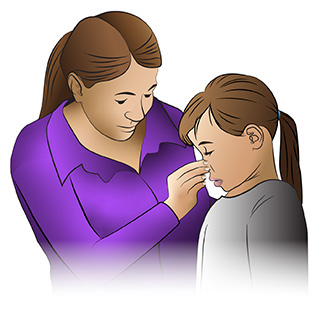Photos

FIRST AID Advice - Nosebleed - Child
- Gently squeeze the soft parts of the lower nose together. Gently press them against the center wall for 10 minutes. This puts constant pressure on the bleeding point.
- Use the thumb and index finger in a pinching manner.
- If the bleeding does not stop, move your point of pressure.
- Have your child sit up and breathe through the mouth during this process.
- If the nose re-bleeds, use the same technique again.
Source: Self Care Decisions, LLC
Used with Permission from Schmitt Pediatric Guidelines LLC.